TOGETHER IN ASIA TO LEARN ABOUT THE PAST, TO CELEBRATE THE PRESENT AND TO PEER INTO THE FUTURE, TO RE-MOTIVATE THE CAMILLIAN MISSIONARY SPIRIT
Meeting of the Superior General, the members of the General Consulta and the major Superiors in Taiwan
Loudong, 18-22 June 2018
Third Day – 20 June 2019
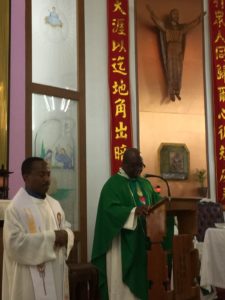 The third day of the meeting of the major Superiors of the Order with the Superior General and the members of the General Consulta began today, 20 June 2018, in Loudong (Taiwan). Fr. Laurent Zoungrana was the chairman of the deliberations of the assembly today.
The third day of the meeting of the major Superiors of the Order with the Superior General and the members of the General Consulta began today, 20 June 2018, in Loudong (Taiwan). Fr. Laurent Zoungrana was the chairman of the deliberations of the assembly today.
The day began with a celebration of the Eucharist presided over by Fr. Guy-Gervais Ayté – today is his forty-fifth birthday.
The morning was dedicated to a general and comprehensive paper on the Vice-Province of Benin-Togo by Fr. Guy-Gervais Aytè, the Vice-Provincial Superior, looking forward to the canonical move to the status of being a Province (this step is envisaged for September 2018). His paper had the significant title: ‘Forty-five Years of the Blessing of God on Mission in Africa’. It went over the history of the arrival of the Camillian religious, starting with the first by now faraway project for the opening of a mission in Benin in the year 1969. The first three Camillians – Fr. Gino Cisternino, Fr. Vincenzo di Blasi and Br. Antonio Pintabona – arrived in Benin exactly forty-five years ago (on March 1973) in response to an invitation of the then Archbishop of Coutonou, Msgr. Christophe Adimou. The first local religious to make a Camillian religious profession, in 1994, were Huber Goudjinou, Raoul Marius Yabi and Robert Koriko who were then consecrated priests in 1998.
At the present time, the Vice-Province has 72 religious who are priests, 7 religious who are brothers, 7 temporary professed, 5 novices, 13 postulants and 11 aspirants. Various confreres, in order to strengthen the exercise of the Camillian charism, have specialised, and are specialising, in various theological, spiritual, bioethical, medical, nursing, diagnostic and pedagogic disciplines. Various confreres live and work abroad to support other Camillian Provinces and Delegations (in Italy, Burkina Faso, Austria, Spain, France and the Central African Republic).
The Vice-Province has 11 communities and one residence. There are various works: a hospital, a home for abandoned elderly people, a health-care centre, a polyclinic-leper clinic, an arable and pastoral farm, a nursing school…).
The life of the Vice-Province is expressed in substantial terms in the commitment of all of its members to live the charism of fraternity: prayer, monthly and annual community retreats, general assemblies, family councils. The Camillian ministry of the religious is alive and very active and enjoys the esteem and appreciation of the people as well as that of the civil authorities: visits and communion for sick people and elderly people in their homes, distance adoption for the education of children, material support for poor people, the spiritual accompanying of frail people, the monitoring and integration of sick people with mental deficits, the animation of hospital chaplaincies, and the accompanying of lay people and in particular of the members of the Lay Camillian Family.
The challenges that await the Vice-Province in the near future are economic sustainability, the implementation of our charism in the context of Africa, the construction and the activation of the centre for formation, the organisation of real governing boards for the administration, management and coordination of all our health-care works, the provision of a monthly salary for religious working in our institutions in order to support the communities to which they belong, and medical insurance and suchlike for all the religious of the Vice-Province.
The paper by Fr. Guy-Gervais Ayté was preceded by a spiritual talk given by Fr. Rosario Mauriello, the Provincial Superior of the Province of Sicily and Naples, the Province that is the ‘mother’ of the Camillian presence in Benin-Togo. Fr. Rosario expressed his joy at the human, spiritual and ministerial pathway that has been followed by the ‘young’ Camillian reality of Benin-Togo (at the present time there are 79 perpetually professed religious) and he described the fine quality of their work for the poor and the sick (health-care activity, cultural activity, activity involving formation, and activity involving the growth and the promotion of public health…). He thanked the confreres of the Vice-Province for the valuable and substantial help that they offer to the ‘mother’ Province: without their presence, their humanity, their fraternity, their skills and expertise and their professionalism, it would not be possible to keep various communities in Italy alive and functioning.
This paper was accompanied by a series of questions posed by major Superiors who were at the meeting: what are the initiatives that have to be addressed on the pathways of achieving the economic sustainability of the Vice-Province and in particular of the two large houses for formation? How are the tensions between the two souls of the Vice-Province being handled – the Togo identity and the Benin identity of the Camillian religious of the Vice-Province? What kind of an outlook is the Vice-Province cultivating as regards the specific development of the Camillian presence in Togo? What initiatives are more necessary for the implementation of the Camillian charism in the Anglophone African area in line with the emphasis of the Vice-Province? What are the challenges for the promotion of vocations and for the formation of religious that come from countries that are so variegated (Benin, Togo, Rwanda, the Central African Republic, Nigeria, the Congo, …)? Are there developments and projects to organise the Camillian foundation in the Central African Republic? What are the reasons why such a large number of religious (as of today forty religious) of the Vice-Province live abroad (for mission, for formation, for the acquisition of professional skills and expertise, and for obtaining funds for economic support)?
The date envisaged for the celebration of the canonical move to having the status of a Province is 14-15 September 2018, on the occasion of the solemn celebration of the priestly ordination of four Camillian confreres.
Br. Ignacio Santaolalla, the financial administrator of the Order, presented the accounts (the budget and annual accounts for 2017 and the budget for 2018) of the generalate house
Fr. Gianfranco Lunardon, the Secretary General of the Order, discussed certain elements relating to the identity and the value of the Historical General Archives and the Current General Archives. He called for greater attention to be paid and precision employed in the use of our Handbook in the preparation of cases relating to the religious and the lives of the communities of the Order. He then provided an update on the development of the Office for Communications of the Order and the state of the restoration work in the mother Church of St. Mary Magdalene.
Fr. Aris Miranda reported on the activities of the Secretariat for Ministry using the heading ‘Revitalisation of the Camillian Ministry’. He presented the results of the international meeting of ‘Camillian’ parishes (San Paolo, Brazil, April 2017) and offered in advance some suggestions for the next international meeting of the administrators of our works (San Paolo, Brazil, October 2019). He commented on the identity (the 4 Rs: Relief-Recovery-Rights-Resilience) and the goals of CADIS (the Camillian Disaster International Service), providing an update on the activities and the kinds of initiatives engaged in, on fund raising activities, and on projects that are still underway.



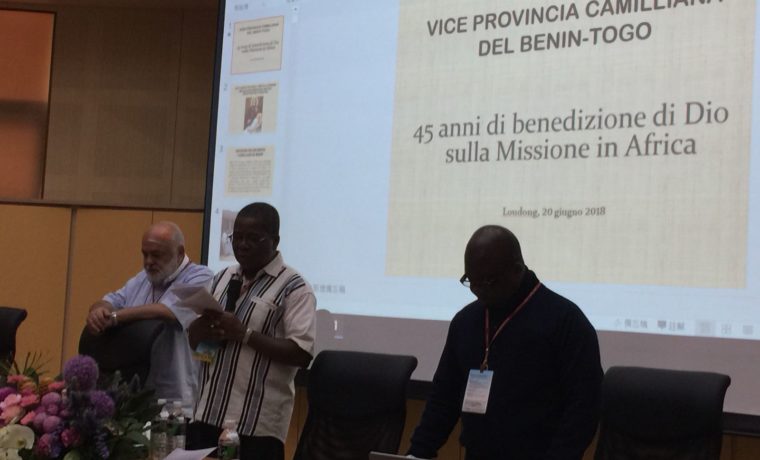
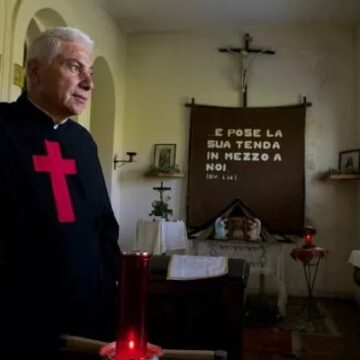

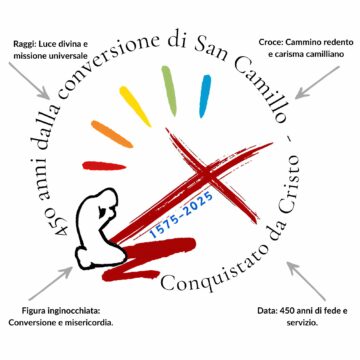


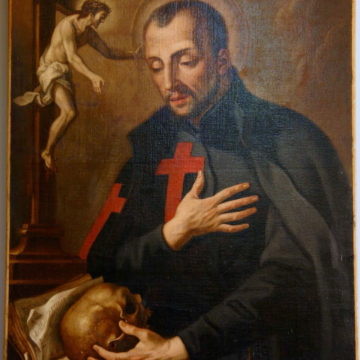


Camillians on Facebook
Camillians on Twitter
Camillians on Instagram